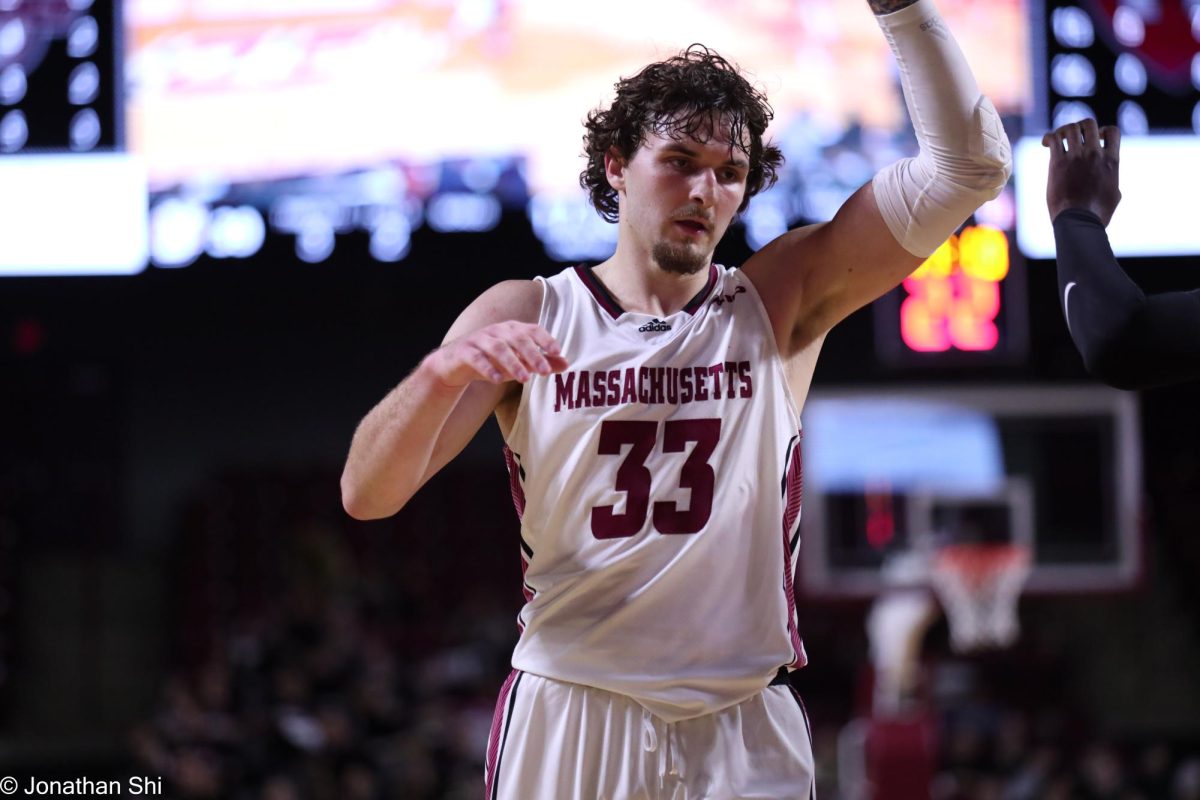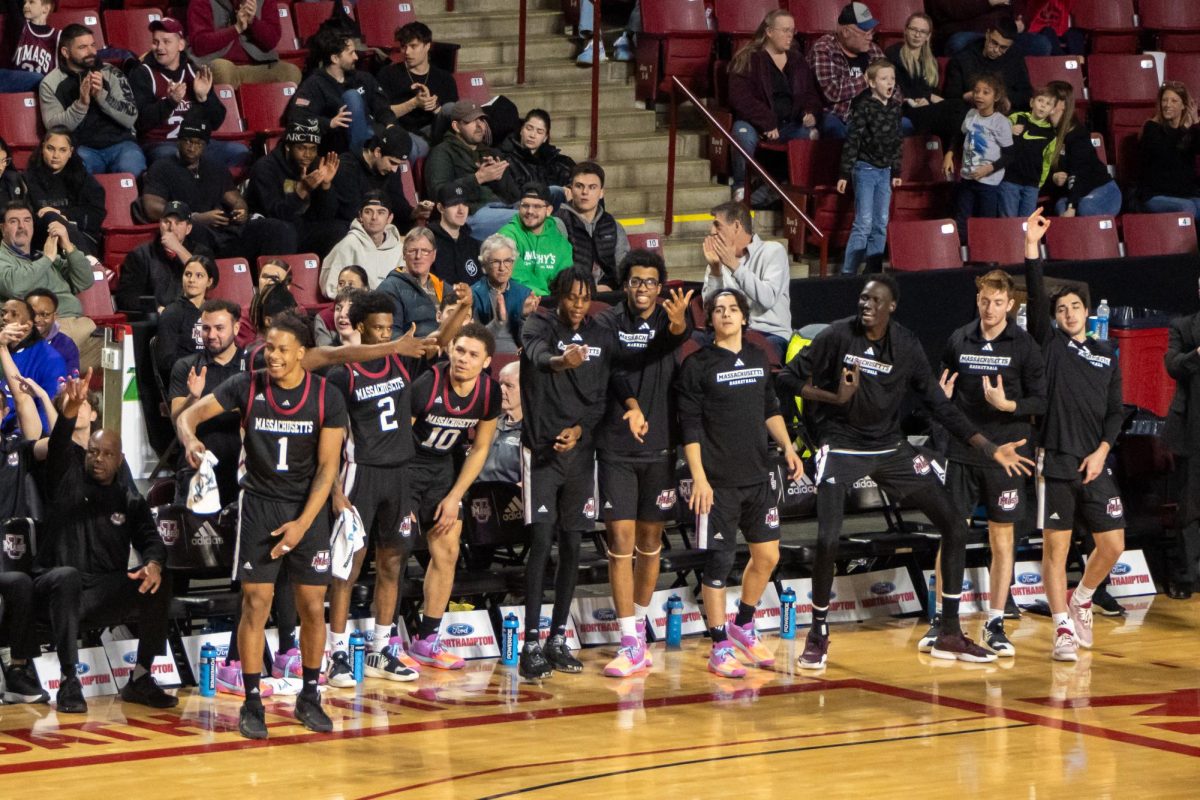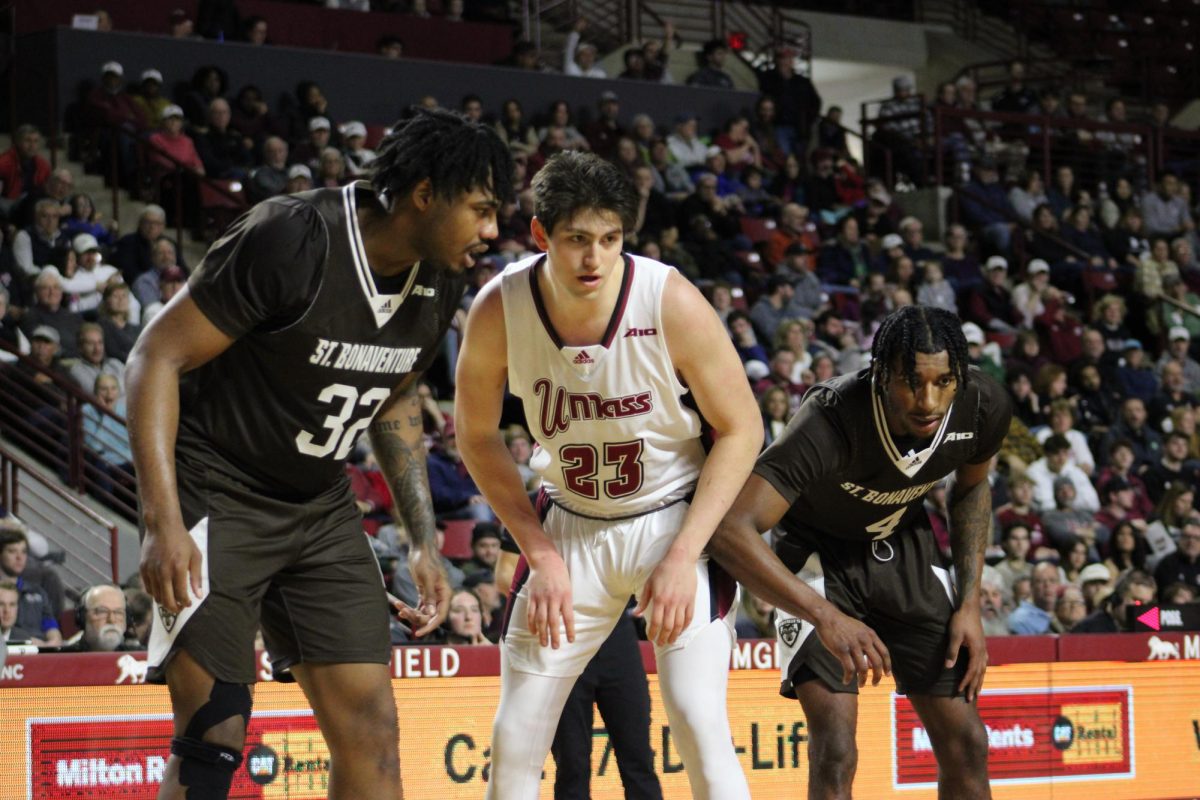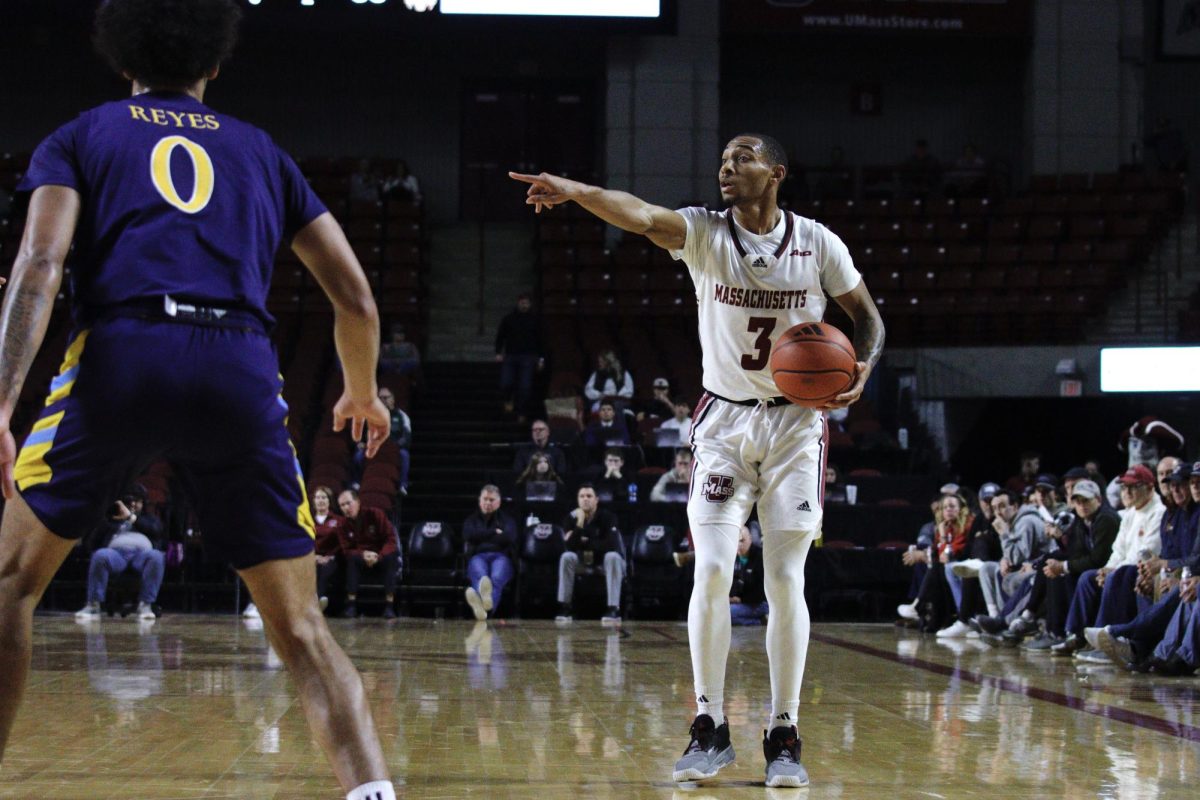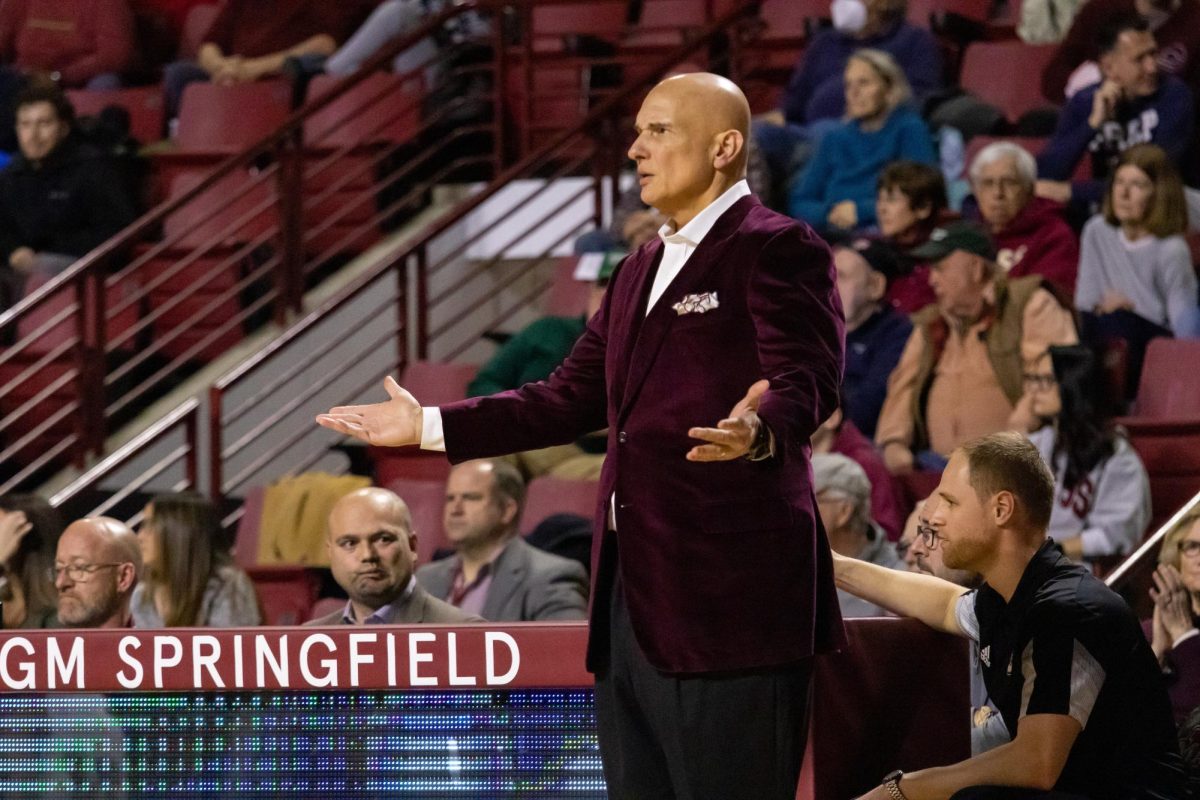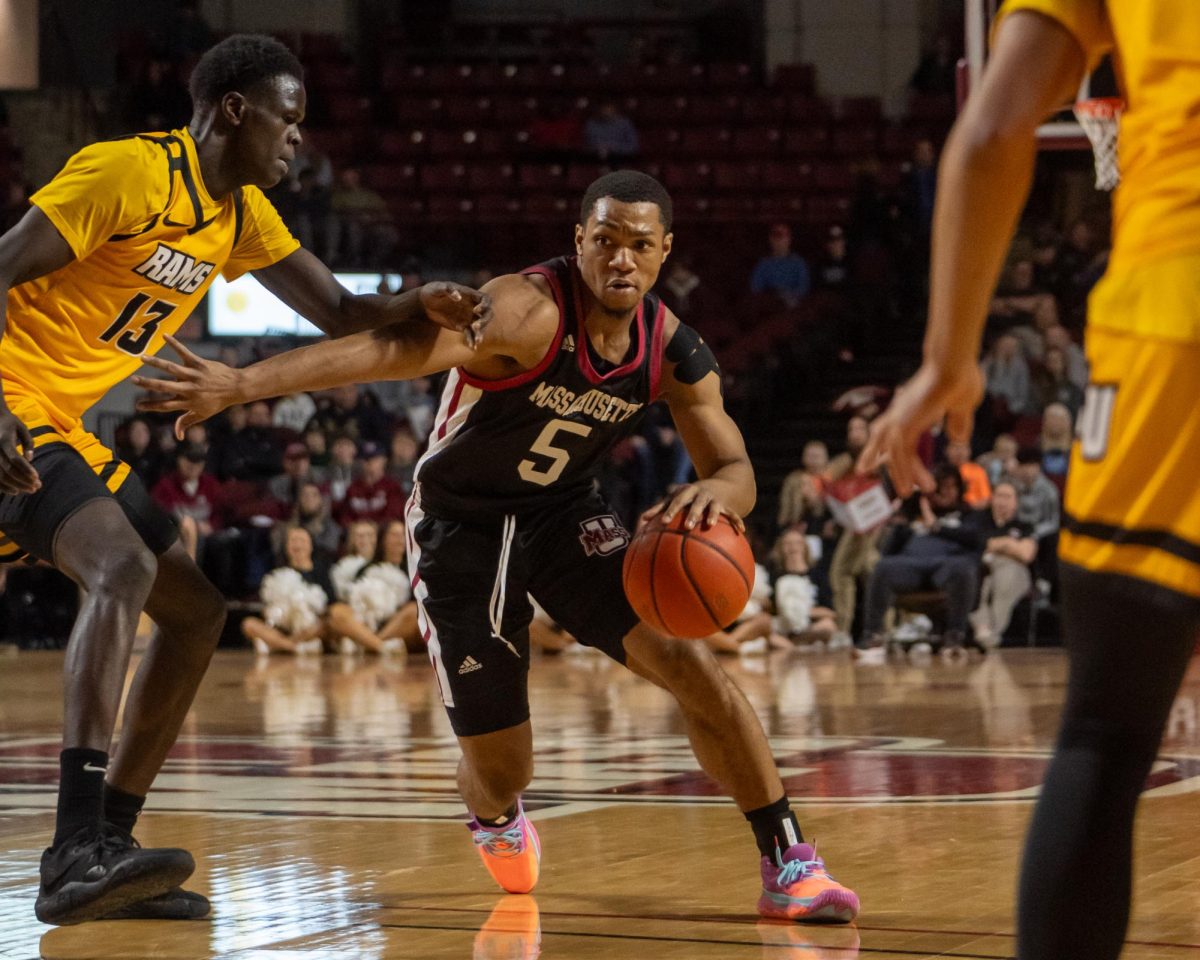
Massachusetts men’s basketball coach Derek Kellogg roamed the sidelines, pacing wildly as he watched his team in yet another closely-contested affair at the Mullins Center on Tuesday night.
With his demeanor unsettling and his slicked-back hair shining under the house lights, he watched nervously as the Minutemen clung to a five-point lead in the final minute their Atlantic 10 tournament first round matchup against Duquesne.
At one point, the Dukes’ Perry Jones unleashed a 3-pointer that was off the mark and sophomore guard Jesse Morgan skied for the rebound. The ball eventually found its way into the arms of Kellogg’s prized point guard, redshirt sophomore Chaz Williams, who was fouled and sent to the free throw line.
Kellogg, anxiously awaiting the inevitable, watched as Williams stepped to the line and knocked down two pressure-cooking free throws that sealed the win.
One final desperation 3-pointer from Duquesne missed as Williams gathered the rebound, then dribbled the clock out. As soon as the clock read all zeros, Williams passed the ball to teammate Sean Carter and leapt into his arms in celebration.
The win meant UMass had earned a hard-earned trip to Atlantic City for the next round of the tournament – the same tournament that the Minutemen won four times during Kellogg’s playing career in the ‘90s.
Yes, there’s quite a difference between the UMass team that Kellogg now coaches and the one that he played on some two decades ago – the same one that made multiple NCAA tournament runs and lifted up a school that hasn’t seen anything like it since.
But if you ask him, that’s not going to last for long.
Kellogg, now in his fourth year as UMass’s head coach, is experiencing his most successful season to date, as the Minutemen have a 21-10 record – the first 20-win season in his tenure – and will be playing on Friday afternoon in the A-10 tournament against Temple in the quarterfinals.
The season has been equally impressive as it was unexpected. UMass was picked to finish 12th out of 14 teams in the conference’s preseason poll, and factoring in the team’s personnel changes, a new style of play and widespread inexperience, 2011-12 was expected to be another long, rebuilding year for the Minutemen.
“A lot of things have fallen into place,” said Kellogg. “There are a group of guys now that enjoy playing the game. They’re in the gym working hard, and if you can combine some kids that have some talent but that are good guys with good character that enjoy playing the game and get in and do extra, I think that’s when you actually have a program.”
This success has some even thinking about a return to the glory days of the early 1990s.
Back then, Kellogg served as a point guard for UMass. From 1991-1995, he helped lead UMass to four consecutive A-10 regular season and conference championships and NCAA tournament appearances.
Now, it’s Kellogg’s leadership on the sidelines and in a suit that has helped bring the program back to relevance. But it hasn’t been easy.
After inheriting the program from former coach Travis Ford – who abruptly left in 2008 to take the head coaching job at Oklahoma State – Kellogg went a combined 24-36 in his first two seasons. The Minutemen didn’t even sniff the postseason.
Then, last season, things finally started to improve for Kellogg. The team started 7-0, but after showing flashes of potential, it dropped back to Earth, losing 15 of its remaining 23 games to finish 15-15.
But patience has finally paid off for Kellogg and his staff, as he now has the most wins of any season during his reign and has high hopes for the postseason.
Even with the success, however, Kellogg isn’t ready just yet to say the team has returned to the greatness of two decades ago. While he sees signs, he knows there’s a lot of work left to do to reach that level again.
“To get back to where it was is something very, very difficult and could be a once in a lifetime proposition,” said Kellogg. “It hasn’t happened really at many schools at this level ever.”
“But at the same token, I feel like we are in the beginning stages of our run or our cycle,” he added. “A lot of things have to happen in your favor for teams to make the NCAA tournament, to make a run in the tournament, but I do feel like the guys are hungry to at some point in their careers, get there.”
Paving the way
Growing up, Kellogg lived in the birthplace of basketball, Springfield, Mass., about a half hour away from Amherst, where his love for the game was born.
At an early age, Kellogg’s father was an important influence not only in getting him to start playing basketball, but little to his knowledge, grow an appreciation for the art of the coaching aspect of the game.
Following a childhood filled with playing youth league ball, Kellogg attended Cathedral High School in Springfield where he was a standout basketball player. At Cathedral, the 1991 graduate was a four-year letter-winner, named a two-time Massachusetts All-State player and McDonald’s honorable mention All-American, and received interest from several colleges.
He ultimately chose UMass, a school he felt very comfortable in attending.
“I enjoyed that it was close to home,” said Kellogg. “Growing up in Springfield and playing high school basketball and seeing that there were basketball crowds and people around here really followed the game drew my interest.”
“And I thought UMass would be a good place to kind of lay the groundwork for me to get a good job getting out of college,” he added.
On the court, Kellogg enjoyed a successful playing career. He was a part of a historic four-year run in which the program went a combined 111-24 and he made the Sweet 16 and Elite Eight in his freshman and senior years, respectively.
But as the sun set on his senior season, so did his career as a player. While he was instrumental in the Minutemen’s success during his years, his talents didn’t really range past the college level, he explained.
“As my career was winding down, the prospects of playing professionally were just OK,” he said. “And I wasn’t a big fan of going overseas with the climate of the world at the time.”
Instead of playing or even pursuing a career in real estate/finance – the field in which he earned his degree – his love for basketball ultimately landed him a job in it.
“I thought coaching would kind of be the closest thing to actually playing and to be able to make a difference in kids’ lives at the college level and to kind of be on that national stage I thought would be a good career path for me,” said Kellogg.
Kellogg snagged a job as a graduate assistant at UMass in 1996 under then-coach Bruiser Flint, which catapulted him to assistant coach positions at George Mason and Youngstown State down the road.
In 2000, he used those experiences to get a job as an assistant coach at Memphis, where his career came full-circle as he reacquainted himself with someone who molded him into the coach he is today, John Calipari.
Tied to greatness
At UMass, then-head coach Calipari was influential in Kellogg’s playing career, but little did either of them know that they would find themselves on the same bench just five years after they said farewell to each other in Amherst.
Calipari, who is currently the head coach at No. 1-ranked Kentucky, has been extremely successful at every program he’s worked at dating back to his days patrolling the sidelines of the Curry Hicks Cage at UMass.
After a short stint coaching in the NBA following his career at UMass, Calipari returned to the college ranks, grabbing the head coaching position at Memphis where he resumed his reign as one of the greatest college coaches in the modern era.
He brought Kellogg in for the season as one of his assistants, where the current UMass coach learned nearly everything he needed to know to become a head coach during an eight-year partnership.
Calipari taught him to, “be true to yourself, work as hard as you possibly can, be committed to the team and the program,” said Kellogg. “I think one of the greatest things about [Calipari] is his passion and intensity and love for the game and that rubbed off on me and I think a lot of the guys that have played for him and coached for him.”
During their eight-year reign together at Memphis, they experienced the same kind of success they had together when they were in Amherst.
The two friends led the Tigers to several Conference USA division, regular season and tournament championships, and five NCAA tournament appearances, including a 38-2 record in their final season together in 2008 which was capped with a trip to the national championship, where they lost in overtime to Kansas.
Kellogg holds those years dear to his heart, and credits Calipari in a big way for teaching him the importance of trust when building a program.
“The biggest thing is the loyalty factor,” said Kellogg. “Coach [Calipari] really surrounded himself with people that he’s loyal to or that are loyal to him, whether it’s former players, whether it’s people he’s known for a long time. And I think that’s one of the most important things with your staff and your players: that they all know that we’re here for each other.”
Now, as he’s close to finishing his fourth season at UMass, Kellogg believes the program is starting to turn a corner, one that Calipari worked so hard to accomplish in the 1990s and then, coincidentally, help indirectly rebuild as he worked with Kellogg during their years together at Memphis.
“It hasn’t happened for a long time, and I think that’s why it’s so special is because it hasn’t been a sustained 20 years of success,” said Kellogg. “We had the run with Coach Cal, Bruiser had a few good years, there’s been some periods of mini-runs, but I believe in my heart that the people can feel and see that this thing might go.”
He still receives encouragement and maintains close relationships with the likes of Calipari, former teammate and current Auburn coach Tony Barbee and countless others who have been important influences to his career.
But after over a decade of learning under the greats, the training wheels have finally come off. It’s Kellogg’s show to run at UMass, and he’s as excited as anyone to see how far it can go.
“I’m so excited. It’s hard to put into words because we’ve struggled at times through the first couple of years here of trying to get the program back on track,” said Kellogg. “And to see a little bit of the rewards of all of the work we’ve put in through some of the hard times, it’s rewarding.”
“This is something that can really blow up and become something special again. And I’m anticipating that that’s going to happen.”
Stephen Hewitt can be reached at [email protected] and followed on Twitter @MDC_Hewitt.

